23 Benefits Of Peppermint Leaves For Skin, Hair, And Health
Stay minty to reduce nausea, treat seasonal fever, eliminate bad breath, and more.
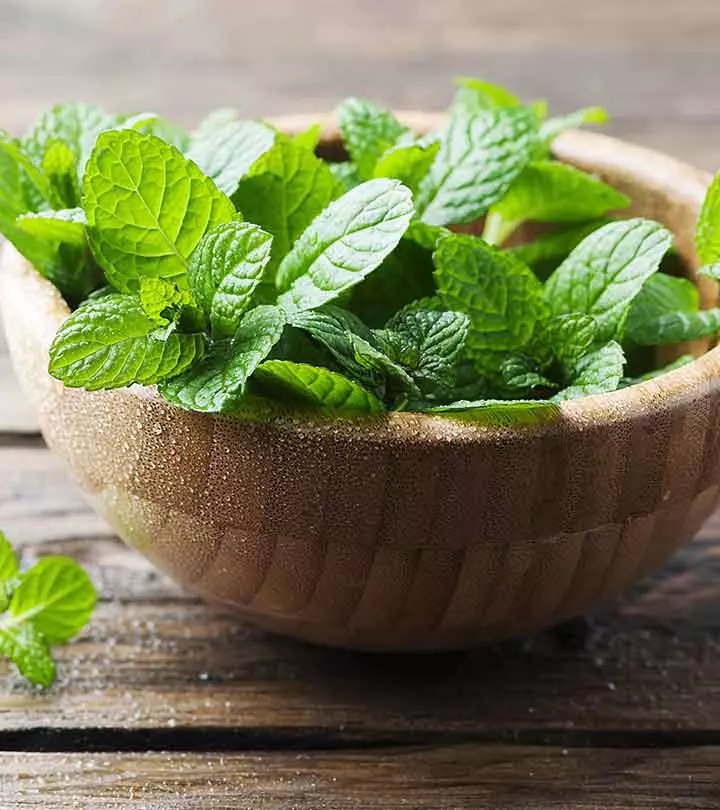
Image: shutterstock
Whether it’s just a refreshing summer mojito, the gorgeous green mint chutney, or the enticing smell of your favorite biryani, peppermint leaves benefits are not just limited to the kitchen! Green, minty, and refreshing, peppermint leaves have found their way to our home in ways beyond their popular culinary usage! Be it their sweet and refreshing aroma used for aromatherapy, or their role in relieving cold and congestion, peppermint leaves are beneficial to us in several significant ways. Peppermint leaves are also a key ingredient in many types of mouthwash, toothpaste, oils, shampoos, and cleansers! So, the next time you pop in that minty chewing gum to refresh your breath, how about you take some time out to know about the other beneficial properties of peppermint leaves as well? To make it easier for you, we have enlisted the key health benefits of peppermint leaves for you! Read on to know more.
 Know Your Ingredient: Peppermint Leaf
Know Your Ingredient: Peppermint LeafWhat Is It?
A small, green leaf of the peppermint plant that has a minty flavor and contains medicinal properties.
What Are Its Benefits?
Helps treat seasonal colds and fevers, manages digestive problems, reduces nausea and bad breath, and improves skin and hair issues.
Who Can Use It?
All except those with diabetes and gastroesophageal reflux disease and kids under the age of 7.
How Often?
Daily, in the form of a digestion tincture or as part of your meals.
Caution
Avoid it if you are allergic to it, undergoing blood pressure treatment, or taking antacids and cyclosporine.
In This Article
Peppermint—A Brief
Botanical Name-Mentha piperitaFamily-LamiaceaeOther Names-
Pudina Patte (Hindi), Milakukkirai vittu (Tamil)
Peppermint, a popular herb known for its distinct aroma and medicinal value, has greenish-purple lance-shaped leaves and a refreshing cool flavor. Due to its refreshing aroma, sharp menthol smell, and cooling sensation, it is often used in home products like bath preparations, mouthwashes, toothpaste, and ointments.
Other than that, peppermint leaf powder is often used for flavoring beverages and other food items. They can also be part of salads and add flavor to drinks or even purified water. The compounds in the leaves are said to have therapeutic and medicinal properties. Peppermint leaves are available throughout the year and are mostly in demand during the summer season due to their cooling effect.
 Trivia
TriviaLet’s see what are the peppermint leaves uses
Key Takeaways
- Peppermint leaves can be used to treat respiratory issues and as a natural remedy for colds and the flu.
- The soothing and healing effects of menthol in peppermint leaves may treat several skin issues.
- A hair rinse made by these leaves helps soothe the scalp and treat dandruff.
- People with diabetes, hernia, and gastroesophageal reflux diseases should avoid using mint.
Peppermint Leaves Benefits
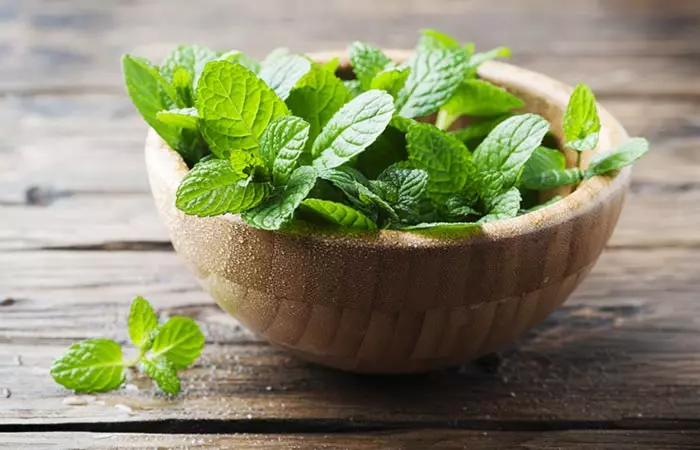
Health Benefits of Peppermint leaves
 Trivia
Trivia- May Improve Liver Function
- Natural Remedy For Cold And Flu
- Treatment Of Respiratory Problems
- Kills Bad Breath
- Anti-Cancer Properties
- Treatment Of Seasonal Fever
- Anti-Bacterial Agent
- May Enhance Memory
- Helps In Reducing Nausea
- Brings Down Headache
- May Aid Digestion
- Peppermint Leaf May Benefit Breastfeeding
- May Help Treas Depression And Stress
- Helps Weight Loss
- May Increase Female Sterility
- Helpful In Treating IBS
- Other Health Benefits
Skin Benefits
Hair Benefits
Other Uses
Health Benefits Of Peppermint Leaves
In addition to their refreshing cooling effect on the taste buds and throat, peppermint leaves are rich in vitamins A and C, iron, potassium, and fiber but low in calories. So, it’s a given that they are used in herbal medicines. The common peppermint benefits are discussed below.
1. May Improve Liver Function
Want healthy and proper functioning of the liver? Opt for the evergreen and tasty peppermint leaves in any form—chewing peppermint leaves raw is also an option.
Why Does It Work
Peppermint leaves improve the liver function by improving the flow of bile from the liver to the gallbladder. Fresh or dried peppermint leaves increase bile flow and aid digestion by breaking down fats and reducing bad cholesterol. Decreased cholesterol improves sluggish liver by lessening the strain on the liver. Fresh peppermint has been shown to calm and soothe the digestive system by relieving symptoms of irritable bowel syndrome including indigestion, dyspepsia and colon muscle spasms (1).
2. Natural Remedy For Cold And Flu

Tired of sneezing all the time? Need a proper remedy to kill bacteria and viruses that cause our common (yet frustrating) cold? Peppermint leaves could be your savior.
Why Does It Work
The menthol in these leaves thins mucus and eliminates phlegm, thus providing relief from a cough and congestion. Menthol is often used as a common ingredient in rubs used on the chest to relieve chest aches experienced during cold and flu. Mint has a calming and numbing effect (2).
3. Treatment Of Respiratory Problems
Instant coughing can be a sign of problematic lungs. So the moment you sense discomfort in your lungs, add peppermint to your diet. Those suffering from asthma and sinusitis too can take refuge in this.
Why Does It Work
Peppermint leaves contain rosmarinic acid which is beneficial in asthma due to its antioxidant properties that neutralize free radicals and block the production of pro-inflammatory chemicals such as leukotrienes (3). Moreover, it facilitates the making of substances called prostacyclins that keep the airways open for easy breathing. Peppermint leaf extract inhibits histamine release, thus alleviating the nasal symptoms of allergic rhinitis (hay fever).
4. Kills Bad Breath
It goes without saying that peppermint works wonders against bad breath. That is why it is one of the key ingredients in chewing gums and toothpaste.
Why Does It Work
Due to its cool refreshing aroma, peppermint leaf extract can be a superior substitute to the mouthwash chemical chlorhexidine to get rid of bad breath. Powdered peppermint leaves were often used in the middle ages to treat halitosisi Bad breath caused due to bacterial activity in the mouth, infection of the gums, poor dental hygiene, or dehydration. and whiten teeth. Merely chewing peppermint leaves gives the effect of a mouth freshener (4).
5. Anti-Cancer Properties
Peppermint is also known to kill away those cancer cells. So why not use it to prevent the deadly disease?
Why Does It Work
According to research, peppermint leaves contain a phytonutrient which has shown to stop the growth of cancerous tumors in the pancreas, liver, and mammary glands, thus protecting against lungs, colon and skin cancers. They also contain a compound called menthol that may inhibit prostate cancer growth (5).
6. Treatment Of Seasonal Fever
Eating peppermint tea or adding it to a bath may help in bringing down fever gently without medicine and any adverse effect on the body’s ability to fight illness.
Why Does It Work
Peppermint leaves are primarily known to help in inducing histamines in the body, thus bringing down the seasonal fever and allergies (6).
7. Antibacterial Agent
Having peppermint leaves can keep you away from all the bacteria-causing diseases.
Why Does It Work
Peppermint leaves have the potential to stop the growth of different bacteria such as Helicobacter pylori, Salmonella enteritidis and methicillin-resistant Staphylococcus aureus (MRSA) (7). They are also effective in inhibiting the growth of certain types of fungus. They are useful in the treatment of infantile colici A behavioral condition in infants where the baby is fussy and cries intensely for hours without any apparent reason. .
8. May Enhance Memory
Do you always forget your car keys and have to come back to get them after locking up your house? It’s time to try the super-cool peppermint leaves to boost your memory.
Why Does It Work
The strong aroma of peppermint leaves may enhance memory and increase mental alertness by calming and soothing the nervous system (8). Peppermint essential oil is extensively used in aromatherapy and its products for stress management.
9. Helps In Reducing Nausea
Traveling for extended hours in a stuffy bus would be anybody’s worst night. The reactions range from uneasiness to a strong urge to vomit. This feeling of nausea and morning sickness that pregnant ladies face can be tackled by chewing mint leaves. You could even have mint tea.
Why Does It Work
The cooling effect induced by the leaves soothes the burning stomach, and the strong flavor eases off the urge to vomit, thus making your day better (9).
10. Brings Down Headache
Despite technological advances in medicine, there’s no real cure for a headache and common cold. Even a slight pain in the head can hamper your work. If all other home remedies including ginger tea haven’t proved helpful, now is the time to try something new. Apply a mint-based balm on your forehead and watch yourself doze off to sleep. Trust me it works!
Why Does It Work
The calming and soothing effect of peppermint makes it a suitable product for a quick relief against a headache. Also, the balm alleviates inflammation, preventing attacks from other conditions like migraines and flu (10).
11. May Aid Digestion
Feeling uneasy after overeating your favorite dish? Well, whenever I find myself in that situation, I reach out for some mint.
Why Does It Work
Mint is known to soothe down the stomach and fight indigestion or any inflammation in the intestines. Also, the aromatic mint leaves activate the salivary glands as well as digestion-inducing enzymes thus, aiding digestion (11). If you feel bloated and unhappy, chew up a few mint leaves. See how it works!
12. Peppermint Leaf May Benefit Breastfeeding
Motherhood is one of the most enjoyable phases of a woman’s life. However, with it comes challenges like soreness of nipples. Soon as you are done with your breastfeeding stage, apply mint oil on the nipples of your breasts to treat cracks and give it a soothing effect. Rubbing mint leaves on the area too helps.
Why Does It Work
As mentioned earlier, the soothing and cooling effect of mint softens the blow of harsh suction, thus bringing down nipple pain (12).
13. May Help Treat Depression And Stress
Did you know that sniffing mint or drinking mint tea may help in bringing down stress? Having a glass of virgin mojito can de-stress you.
Why Does It Work
Being a natural stimulant, the refreshing aroma of mint may leave you free and happy all day long, giving you the much-needed boost (13)!
14. Peppermint Leaf For Weight Loss
Did you ever think that having something tasty can help you shed weight? Mint is a flavor most people love. And chewing mint does help you lose weight.
Why Does It Work
We already know that mint is a stimulant which triggers the release of proper digestive enzymes and aids proper digestion. This, in turn, helps in absorbing all the proper nutrients in the food we consume and equally distributes fat in the body (14).
15. May Increase Female Sterility
This is why mint must become an essential part of your diet (15).
16. Helpful In Treating IBS
Irritable Bowel Syndrome (IBS) can leave you frustrated and agitated. Add mint to your food and see the effect it has on your stomach.
Why Does It Work
Peppermint has a soothing effect on your stomach muscles, thus relaxing them and also helps ease clonic spasms (16).
17. Other Benefits
The aromatic compounds in peppermint leaves relieve muscle spasms, increase blood circulation, reduce pain and promote sweating while the astringent compounds shrink inflamed tissues. They are excellent sources of potassium, calcium, iron, manganese, and magnesium. Potassium is a vital component of cells and body fluids that control heart rate and blood pressure, while manganese works with copper as a cofactor for an antioxidant enzyme, superoxide dismutase.
Emileigh Radcliff, a lifestyle blogger, shares her experience of using peppermint oil to relieve her chronic pain issues. She writes, “I did find some relief in the peppermint-coconut grease I smeared all over my un-ripped abs. The scent, while overpowering, is energizing yet relaxing, which helps the pain a bit more. Not only did the peppermint oil help my fibromyalgia pain, but it also seemed to alleviate some IBS pain (i).”
Skin Benefits Of Peppermint Leaves
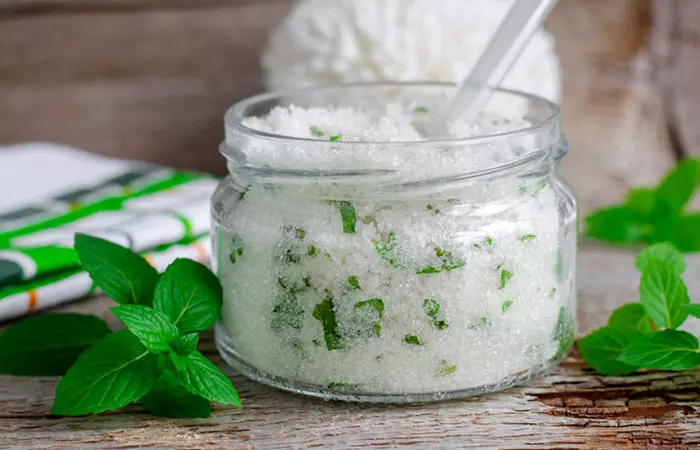
In addition to their numerous health benefits, peppermint leaves can be beneficial for your skin too. Here’s how:
18. Maintenance Of Skin Health
Peppermint leaves can help you get that smooth and shiny skin and maintain it as well.
Why Does It Work
The nutrients in peppermint leaves help tone the skin, minimize pores, reduce swelling and restore skin elasticity. Vitamins A and C are powerful antioxidants that fight inflammation appearing in the form of red marks on the skin. B vitamins, riboflavin, and folate, brighten the complexion. These leaves can be powdered in sugar scrubs to have an invigorating effect on the skin (17).
19. Herbal Remedy For Skin Problems
Peppermint leaves are used as an ingredient in topical creams meant for treating a variety of skin issues like hives, rashes, poison oak or poison ivy. Application of these ointments has a soothing and healing effect on the skin.
Why Does It Work
Being a natural ingredient, it is a no-side-effect option to all the skin troubles and preferred because of its soothing and cooling effect on the body (18).
Hair Benefits Of Peppermint Leaves

Due to a healthy combination of vitamins, minerals, and antioxidants, peppermint leaves promote hair health. Many experts also recommend the use of peppermint oil for hair. The essential oil extracted from the peppermint leaves soothes the scalp, boosts blood circulation, and rejuvenates hair. Below, we have discussed the benefits of using peppermint leaves for hair –
20. Treatment Of Dandruff
A strong tea made from peppermint and nettle leaves can be used as a hair rinse to get rid of dandruff. It helps soothe the scalp and promotes hair growth too (19).
21. Treatment Of Head Lice
Due to the antibacterial properties of this herb, peppermint extract is effective in treating head lice infestation (20).
Other Uses
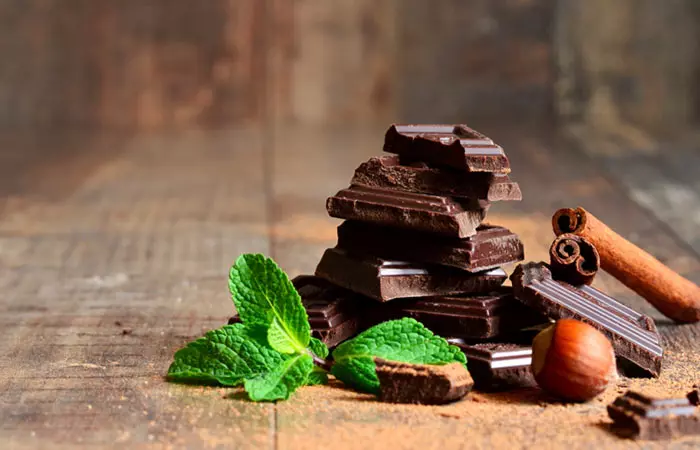
22. Popular Ingredient in Chocolates And Candies
Peppermint is used worldwide in the production of many commercial candies and chocolates which we all love as well as in many alcoholic and non-alcoholic beverages. It is added to many breath fresheners like menthol chewing gums.
23. Used In Commercial Cosmetics
Its ability to reduce inflammation and calming effect on nerves makes it one of the most preferred ingredients in the production of balms and pain-relief sprays.
A Word Of Caution
There are two sides to a coin. Likewise, mint too has its benefits and drawbacks. Here are a few points you must keep in mind.
For your safety, I would suggest you take your family doctor’s advice before opting for a mint diet.
Physicians advise against peppermint use if you
- Are suffering from diabetes as peppermint can increase the risk of hypoglycemiai A condition in which the blood sugar levels are below the standard range of 70mg/dL, caused mainly by diabetes treatment.
- Are a kid below seven years.
- Are on a regular dose of antacids as peppermint can increase the risk of heartburn
- Are on a dose of cyclosporine
- Have Herniai Protrusion of an organ or tissue through a weak spot in the enclosing muscle or tissue, which usually occurs in the stomach or intestine.
- Are suffering from gastroesophageal reflux diseases
- Are on medication that is metabolized by liver
- Are being treated for blood pressure
- Are allergic to menthol
- Have a sensitive digestive system
How To Make Digestion Tinctures Using Peppermint
Let’s see how we can make digestion tinctures out of peppermint leaves.
What You Need
- Half cup dried peppermint leaves
- 1/4 cup finely chopped ginger root
- 1/4 cup fennel seeds (dried and crushed)
- 1 1/2 cups of water (boiled)
- 1 1/2 of your choice of alcohol (vodka or rum)
- A glass jar
How to Make
1. Start by putting mint, ginger and fennel seeds in the glass jar and pour boiling water up to their position (properly covering them).
2. Now, fill in the jar with the alcohol and put the lid on really tightly.
3. Store the jar for at least two weeks in a cold and dark place. Make it a point to shake it daily.
4. After two weeks, strain out the contents using a muslin cloth and store in small jars using them as per requirement.
How Much You Need To Have
Adults:
Up to 1 tablespoon can be taken daily with water
Pregnant Ladies: Half a spoon of tincture in the morning to avoid morning sickness
Kids: Up to 15 drops are enough
While understanding the recommended intake of peppermint is essential, it is equally important to be aware of associated precautions to ensure its safe use. Scroll down to know more.
Safety And Precautions
While peppermint leaves have many health benefits, using them safely requires taking some care.
- Take them in moderation. Heartburn, dry mouth, and nausea are among the adverse effects that may result from consuming large quantities of peppermint leaves or peppermint oil.
- Consult a doctor before using peppermint if you are pregnant or nursing as it may trigger uterine contractions or upset the infant’s stomach.
- Talk to a healthcare provider about possible drug interactions if you are on medication. Some medications, including blood pressure medications and antacids, may interact with peppermint.
- Avoid peppermint oil if you have liver or gallbladder problems as it can worsen symptoms due to its high menthol concentration, which can cause liver inflammation or bile duct spasms.
People also often use spearmint for the aforementioned remedy as it is closely related to peppermint. Find out which of these two is better for you.
Peppermint VS. Spearmint
Peppermint is a hybrid of spearmint and water mint. However, peppermint has a stronger and more intense flavor compared to spearmint, which has a milder, sweeter flavor. Spearmint’s flavor is often described as fresh, clean, and slightly earthy, which is in contrast to the slightly spicy, sweet, and cool minty taste of peppermint. Another major difference, apart from their flavor, lies in their menthol content. Peppermint contains a higher concentration of menthol than spearmint, which is why it has a stronger mint flavor (21). Both peppermint and spearmint are part of the mint family and are used for various culinary and medicinal purposes. Choosing one between them depends on the specific home remedies you want to try out or the flavor you desire for your dishes.
Infographic: 7 Amazing Health Benefits Of Peppermint Leaves
The benefits of peppermint leaves extend beyond refreshing your breath. Since ancient times, these potent leaves have been used for medicinal purposes. Peppermint leaves have several health advantages, including improving digestion and boosting the immune system. They might just be a simple yet effective solution to boost your overall well-being. Check out the infographic below to learn more about the top health benefits of including peppermint leaves in your diet.
Some thing wrong with infographic shortcode. please verify shortcode syntaxThe many benefits of peppermint go beyond their uses for culinary purposes. They have an enticing smell too. Peppermint leaves may improve your liver function, offer relief from cold and cough, prevent bad breath, protect against colon, lung, and skin cancers, and treat seasonal fever. In addition, the soothing properties of these leaves may treat skin issues like rashes and hives and help treat dandruff and head lice. If you have not used peppermint leaves before, start using them to reap their benefits.
Frequently Asked Questions
When should I drink peppermint tea?
Peppermint tea is a caffeine-free hot beverage, and it is recommended to drink at any time of the day.
Are mint and peppermint the same?
Mint is a generic term in the Lamiaceae family and contains menthol. Peppermint is one of the varieties of mint, and it is a blend of spearmint and water mint leaves.
Take care!
How do I store fresh peppermint leaves for later use?
Cut the stems of the peppermint leaves and place them in a large jar. Alternatively, you can wrap peppermint leaves in a wet paper towel and place them in a plastic bag without sealing.
Can peppermint leaves be used as a natural insect repellent?
Yes, studies suggest that peppermint oil has biocidal properties that may help repel mosquitos and bugs (22).
Illustration: Benefits Of Peppermint Leaves For Skin, Hair, And Health
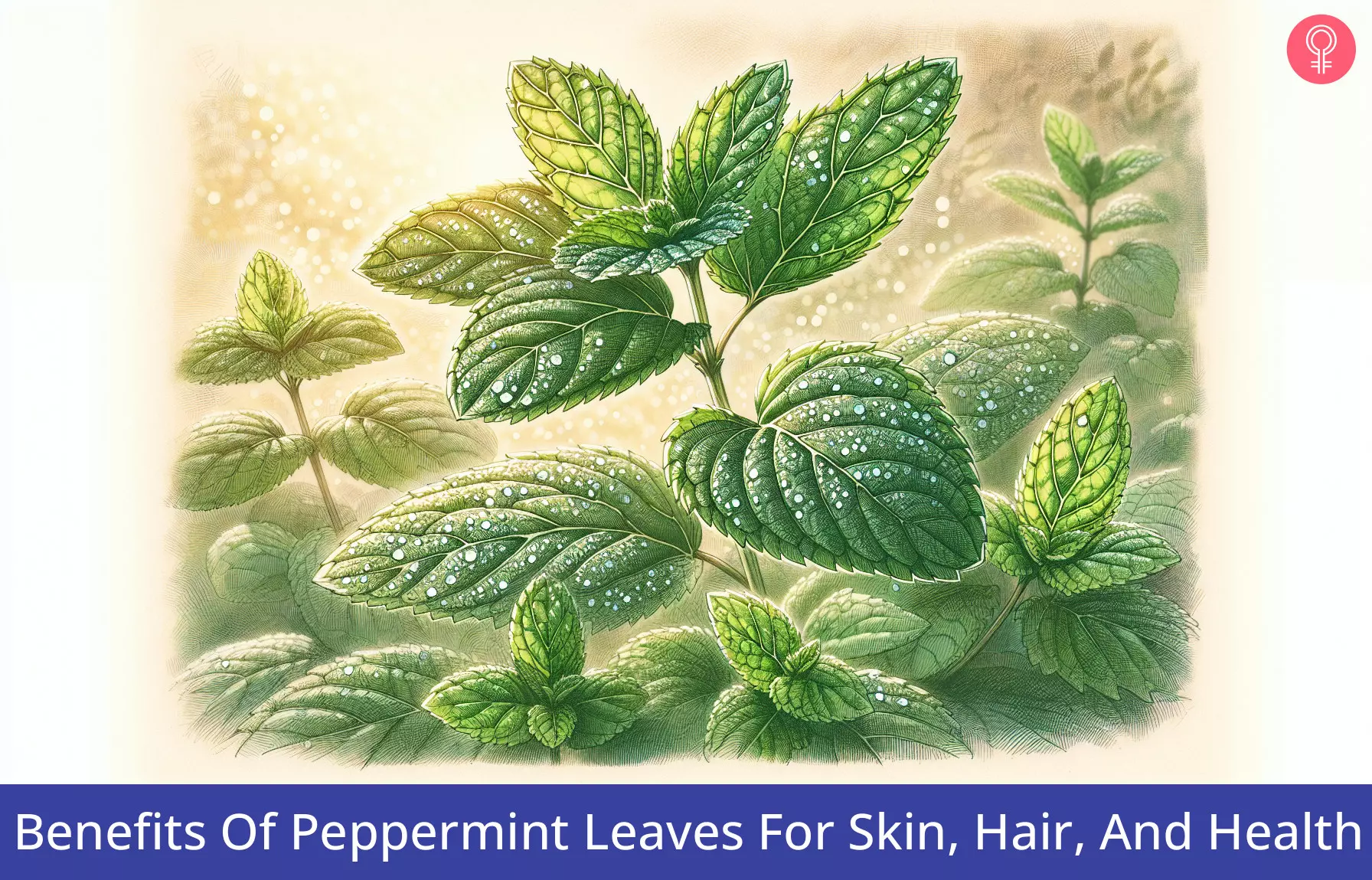
Image: Dall·E/StyleCraze Design Team
Uncover the remarkable health benefits of peppermint in this video. From aiding digestion to refreshing your breath, this versatile herb can enhance your life in many ways.
Personal Experience: Source
StyleCraze's articles are interwoven with authentic personal narratives that provide depth and resonance to our content. Below are the sources of the personal accounts referenced in this article.
i. I Tried Peppermint Oil For My Chronic Pain. Am I Cured?https://medium.com/@emileighr/i-tried-peppermint-oil-for-my-chronic-pain-am-i-cured-bab58834ead9
References
Articles on StyleCraze are backed by verified information from peer-reviewed and academic research papers, reputed organizations, research institutions, and medical associations to ensure accuracy and relevance. Read our editorial policy to learn more.
- Effect of peppermint oil on serum lipid peroxidation and hepatic enzymes after immobility stress in mice
https://www.ncbi.nlm.nih.gov/pmc/articles/PMC3362857/ - TRPM8: from cold to cancer peppermint to pain
https://pubmed.ncbi.nlm.nih.gov/20932257/ - Treatment of upper respiratory tract infections in primary care: a randomized study using aromatic herbs
https://www.ncbi.nlm.nih.gov/pmc/articles/PMC2967840/ - Evaluation of the use of a peppermint mouth rinse for halitosis by girls studying in Tehran high schools
https://www.ncbi.nlm.nih.gov/pmc/articles/PMC3894100/ - Menthol: An underestimated anticancer agent
https://www.ncbi.nlm.nih.gov/pmc/articles/PMC10063798/ - Effects of peppermint (Mentha piperita L.) extracts on experimental allergic rhinitis in rats
https://pubmed.ncbi.nlm.nih.gov/11201253/ - Antibacterial and antifungal activity of ten essential oils in vitro
https://pubmed.ncbi.nlm.nih.gov/8893526/ - Cognitive Facilitation Following Intentional Odor Exposure
https://www.ncbi.nlm.nih.gov/pmc/articles/PMC3231408/ - Controlled breathing with or without peppermint aromatherapy for postoperative nausea and/or vomiting symptom relief: a randomized controlled trial
https://pubmed.ncbi.nlm.nih.gov/24461278/ - Essential plant oils and headache mechanisms
https://pubmed.ncbi.nlm.nih.gov/23196150/ - Gastrointestinal clinical pharmacology of peppermint oil
https://pubmed.ncbi.nlm.nih.gov/16121522/ - Effect of Peppermint Water on Breast Crack
https://clinicaltrials.gov/study/NCT00456404 - The effects of aromatherapy on pain depression and life satisfaction of arthritis patients
https://pubmed.ncbi.nlm.nih.gov/15778570/ - Using herbal remedies to maintain optimal weight
https://www.ncbi.nlm.nih.gov/pmc/articles/PMC2927017/ - Oviposition-altering and ovicidal potentials of five essential oils against female adults of the dengue vector Aedes aegypti L
https://pubmed.ncbi.nlm.nih.gov/21445613/ - Peppermint oil in irritable bowel syndrome
https://pubmed.ncbi.nlm.nih.gov/16121521/ - Natural oils affect the human skin integrity and the percutaneous penetration of benzoic acid dose-dependently
https://pubmed.ncbi.nlm.nih.gov/16700820/ - Acne off acne treatment facial- salicylic acid lotion
https://dailymed.nlm.nih.gov/dailymed/archives/fdaDrugInfo.cfm?archiveid=186096 - Peppermint oil promotes hair growth without toxic signs
https://www.ncbi.nlm.nih.gov/pmc/articles/PMC4289931/ - The potential effectiveness of essential oils as a treatment for headlice Pediculus humanus capitis
https://pubmed.ncbi.nlm.nih.gov/9439284/ - Yield content and composition of peppermint and spearmints as a function of harvesting time and drying
https://pubmed.ncbi.nlm.nih.gov/20942459/ - Larvicidal and mosquito repellent action of peppermint (Mentha piperita) oil
https://www.researchgate.net/publication/45533843_Larvicidal_and_mosquito_repellent_action_of_peppermint_Mentha_piperita_oil
Read full bio of Jess Wharton
Read full bio of Tanya Choudhary
Read full bio of Ravi Teja Tadimalla
Read full bio of Himanshi Mahajan





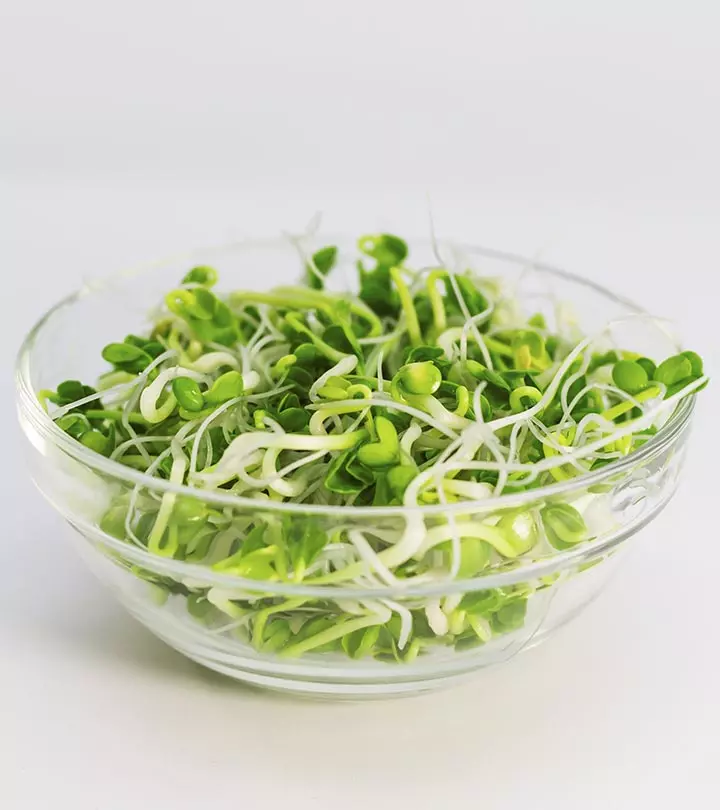
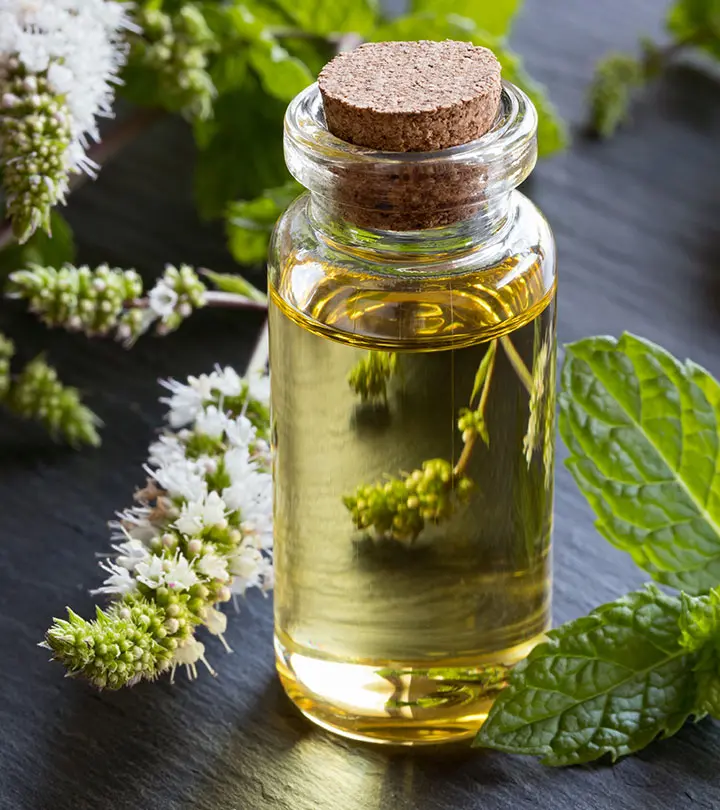
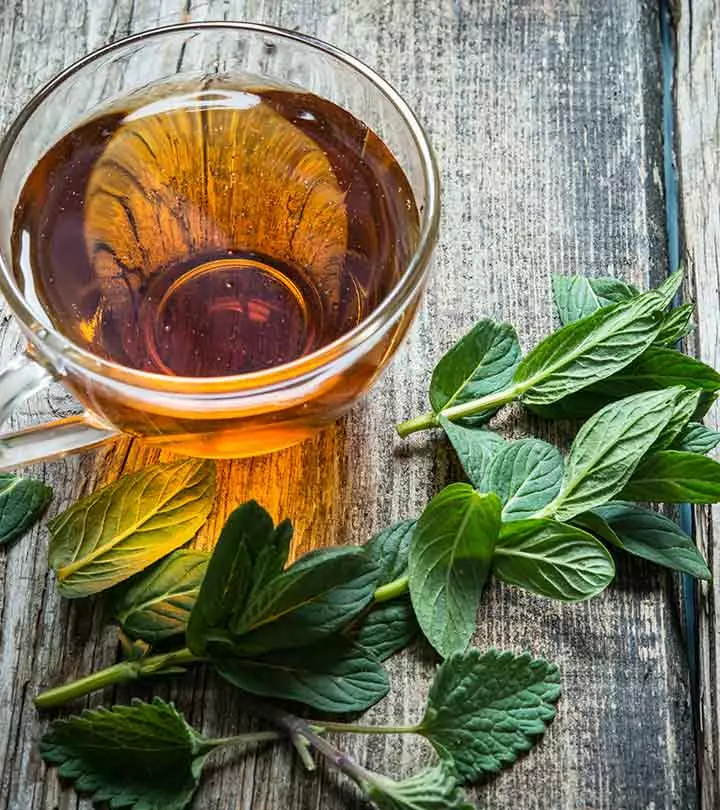
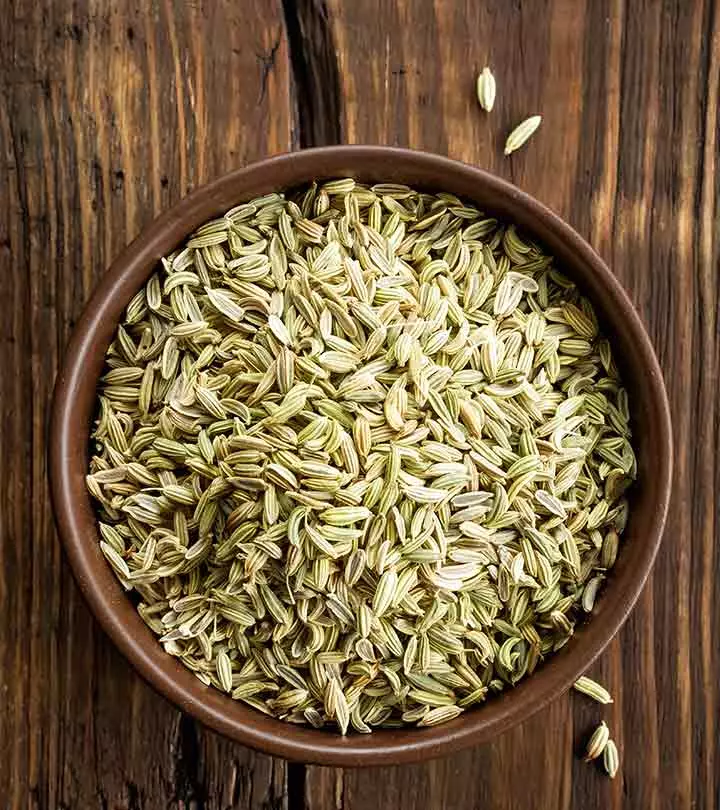

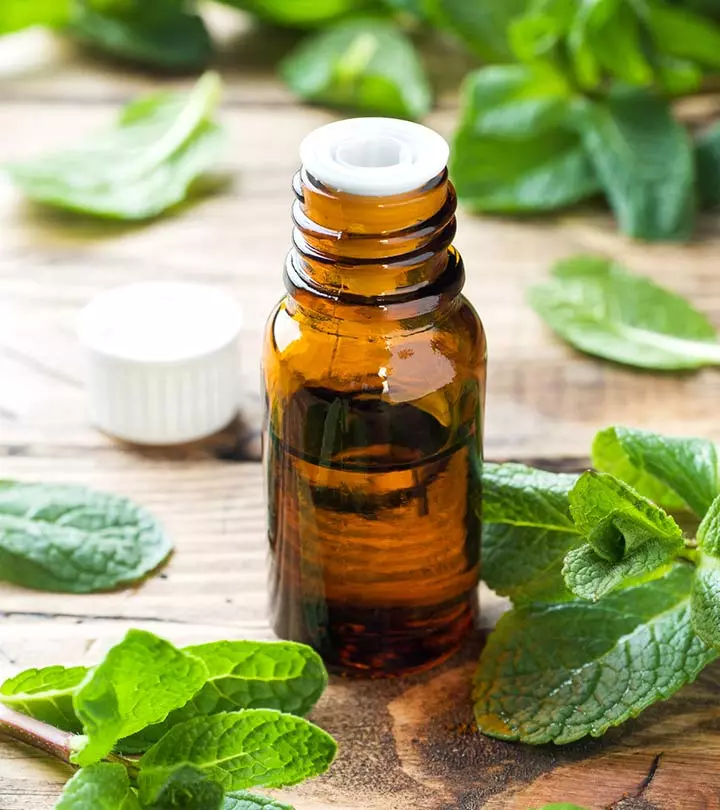
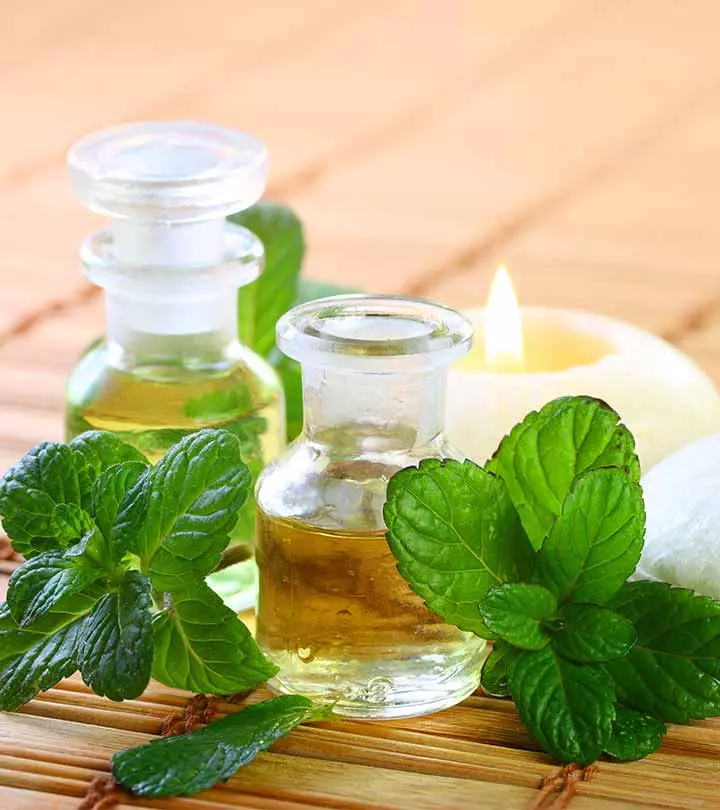
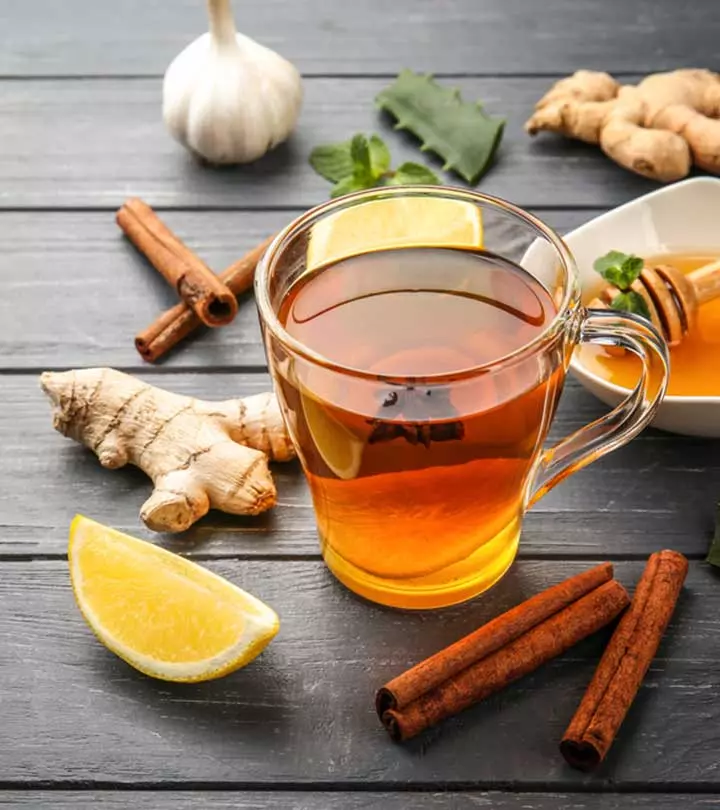
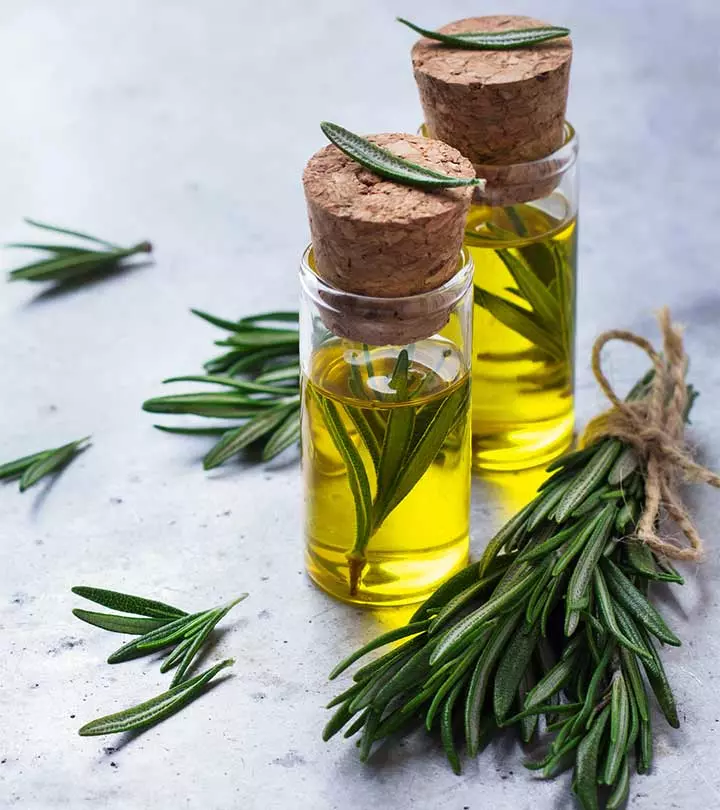
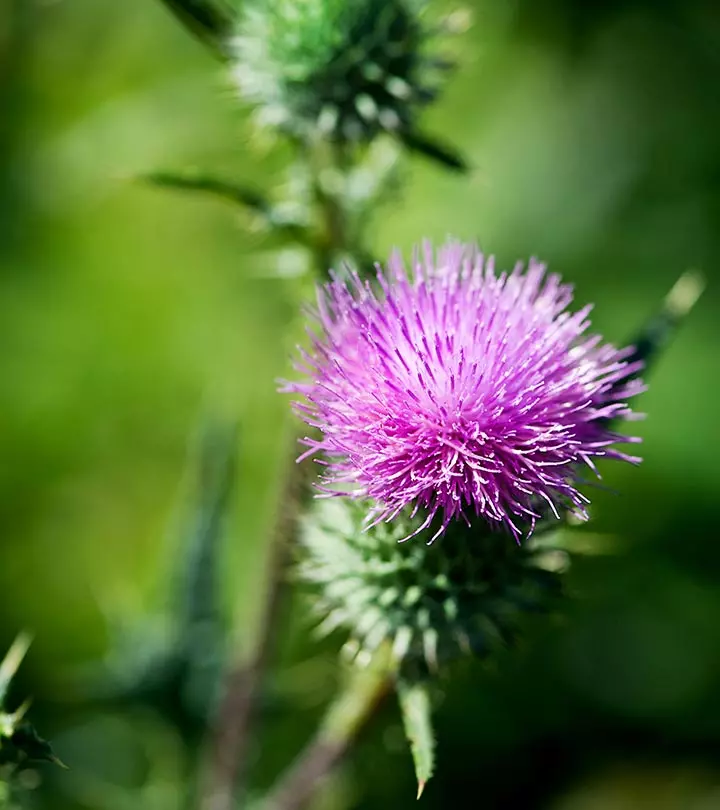
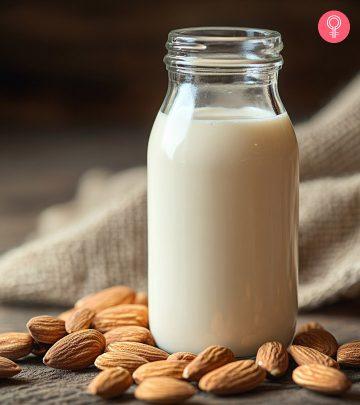
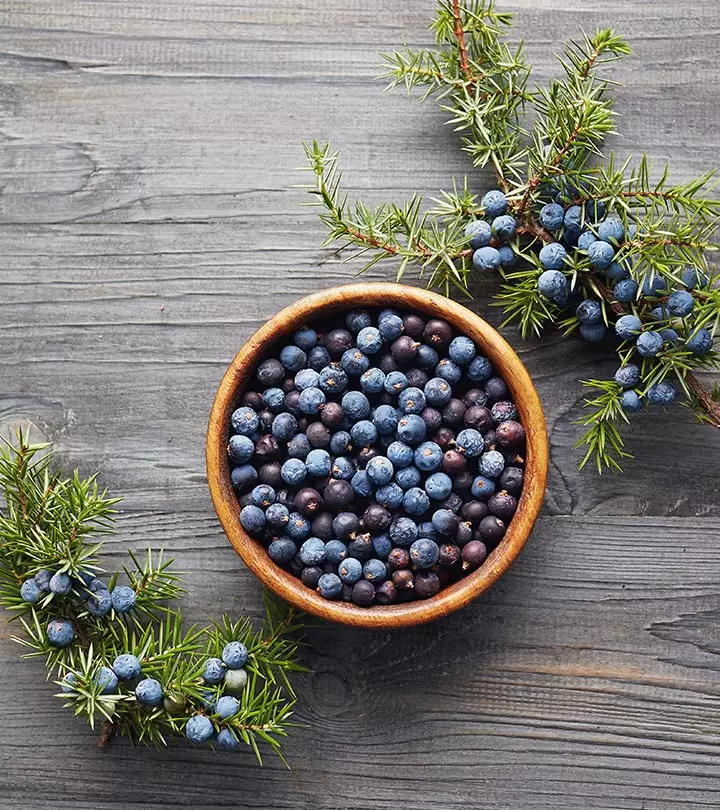

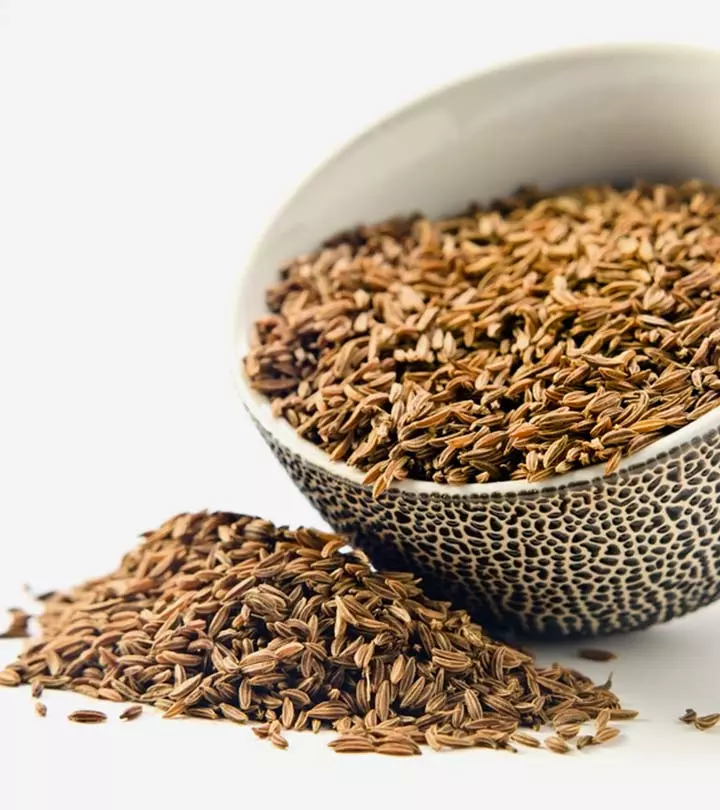
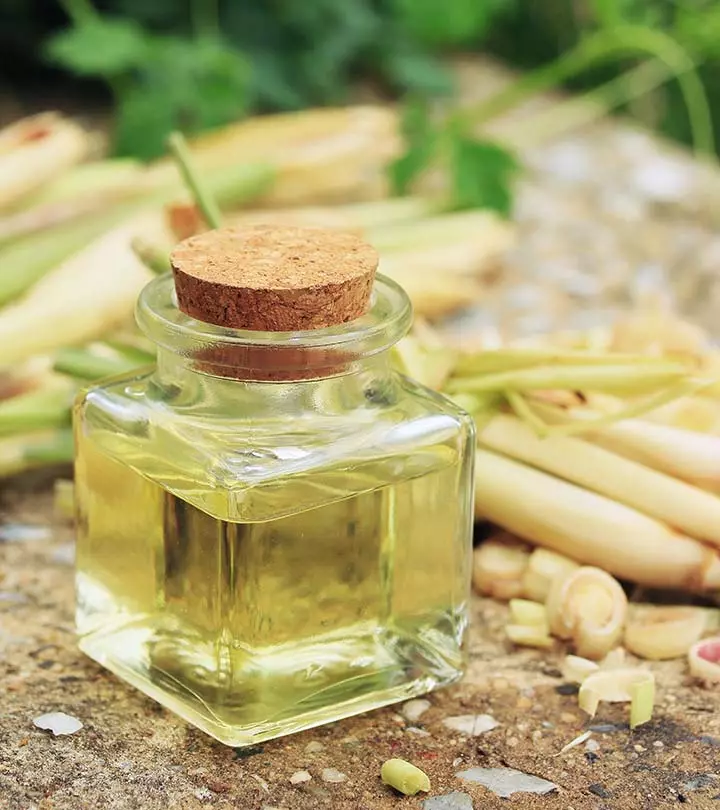
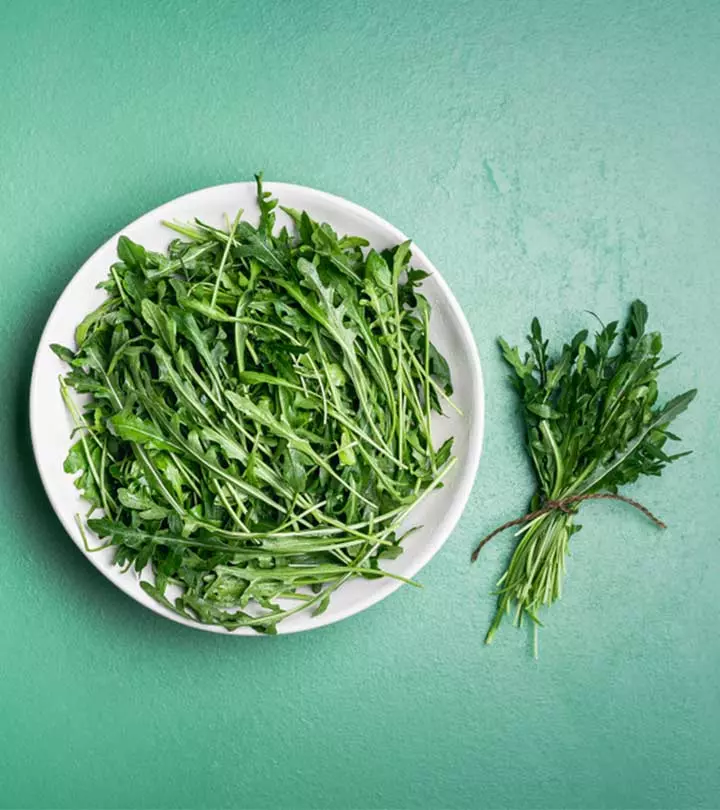
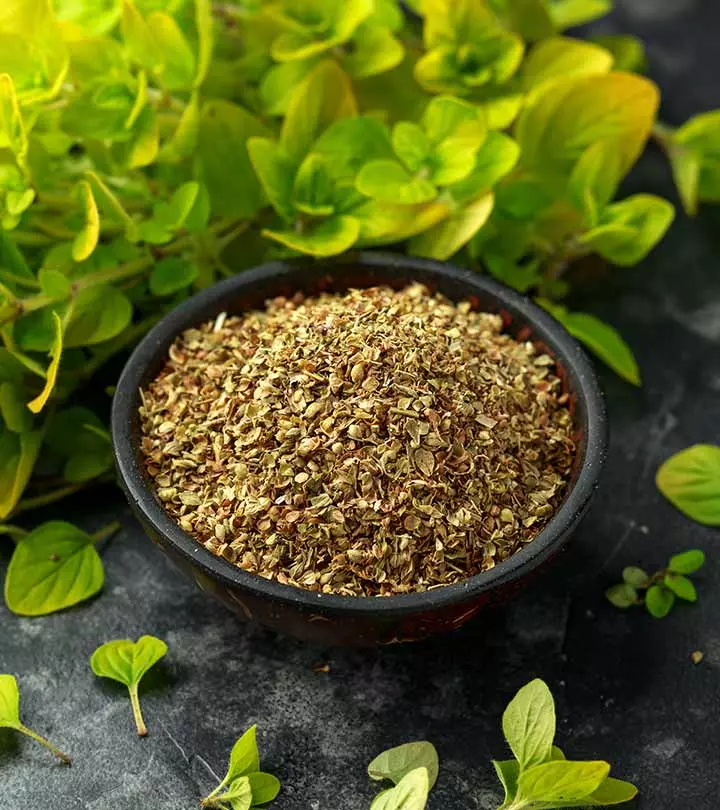
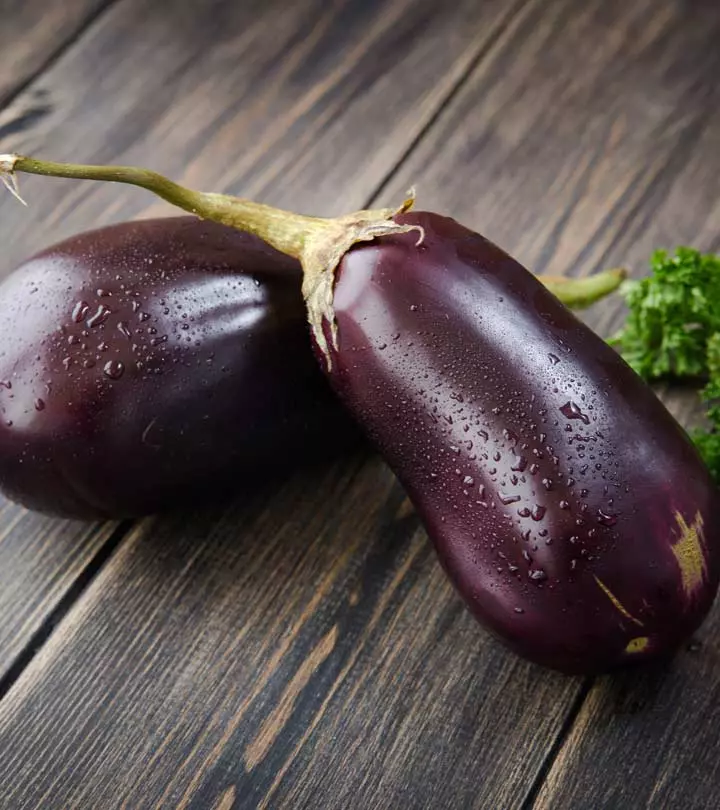
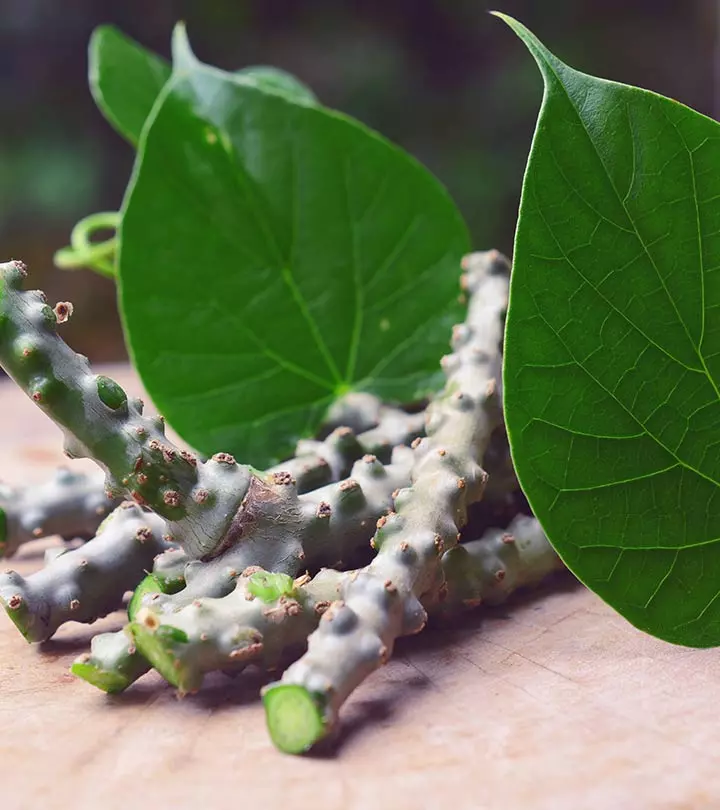
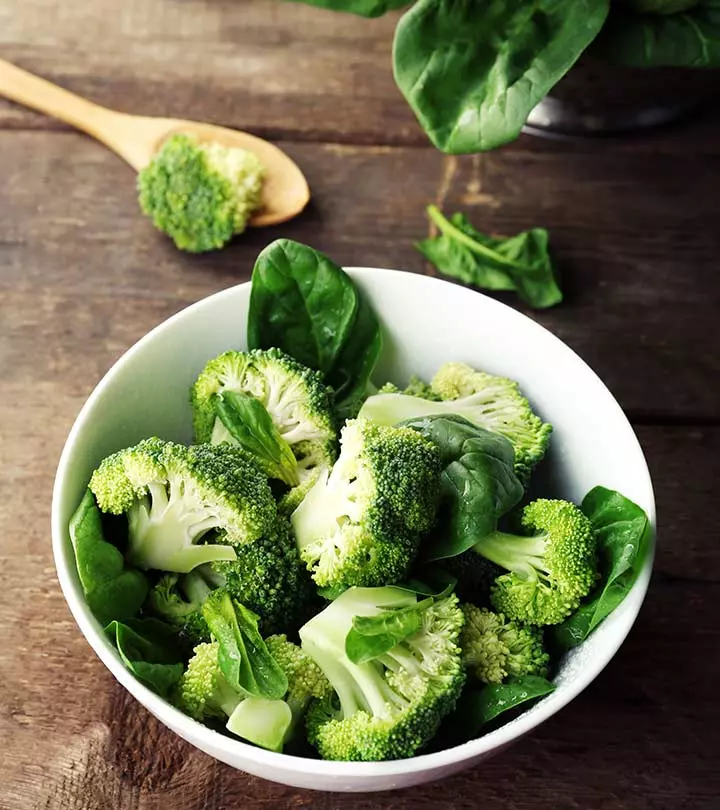
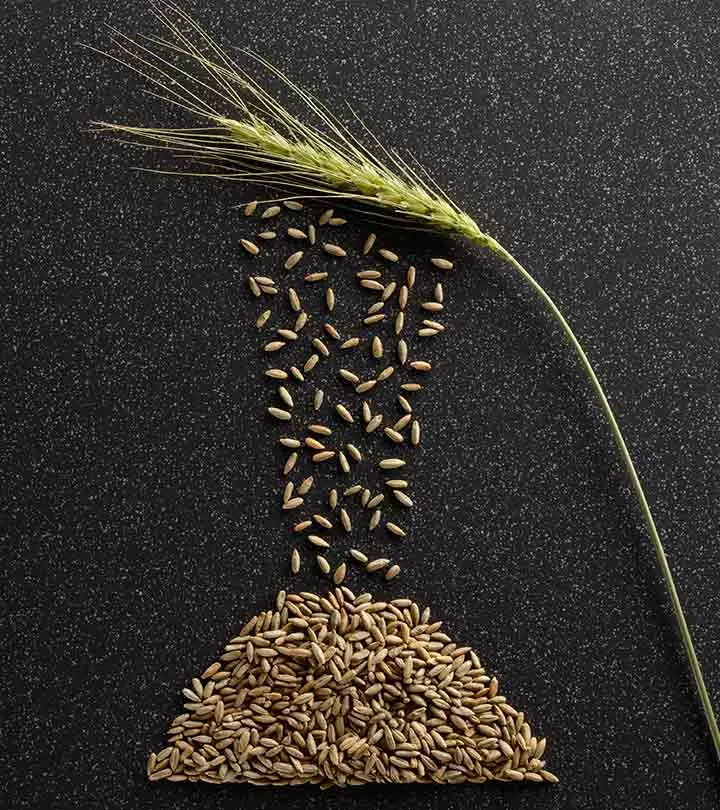
Community Experiences
Join the conversation and become a part of our empowering community! Share your stories, experiences, and insights to connect with other beauty, lifestyle, and health enthusiasts.